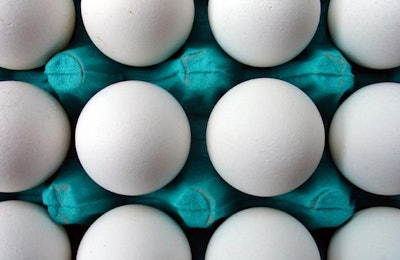
Cal-Maine Foods Inc. ended its fourth quarter of its fiscal 2017, and its entire fiscal year, with a net loss, thanks to the prolonged effects of the U.S. avian influenza outbreak among other factors.
On July 24, the Jackson, Mississippi, egg producer released its financial results for the quarter, and fiscal year, which ended on June 3.
The world’s largest egg company reported a quarterly net loss of $24.5 million, compared with a $376,000 loss in the same period of the previous year. On the fiscal year, it reported a net loss of $74.3 million, compared with a net income of $316 million the previous year.
In a statement, Dolph Baker, chairman, president and CEO of Cal-Maine, said the company faced “extraordinary” market conditions in fiscal 2017, and its results reflect the on-going volatility of the egg market. After the avian influenza outbreak of 2014-2015 rocked the domestic egg market, the U.S. industry, and its customers, are still working to normalize. The issue is compounded by the current surplus of eggs in the market and the continuing transition to cage-free egg farming.
“Together, these factors have created an oversupply and market prices have fallen accordingly. We do not expect to see any meaningful improvement until there is a better balance of supply and demand. However, we are encouraged by recent USDA reports indicating the chick hatch has been trending down for the last 10 out of 11 months, suggesting there may be a moderation in the size of the laying hen flock as we move forward,” Baker said.
Specialty and cage-free markets
As the egg industry continues working to meet the cage-free pledges of its customers, Cal-Maine reports specialty eggs are accounting for a greater portion of its annual revenue. In fiscal 2017, specialty eggs accounted for 43.6 percent of total shell egg revenue, compared with 29.1 percent the previous year. Specialty egg prices were 12.4 percent lower in fiscal 2017 than fiscal 2016.
“Our specialty egg business has continued to be a primary focus of our growth strategy. We have made significant investments across our operations to meet anticipated demand for cage-free eggs,” Baker said in a statement. “With the recent low prices of conventional eggs and typical seasonal fluctuations, demand trends for cage-free eggs slowed down in the fourth quarter, resulting in a higher supply of specialty eggs. We have adjusted our production levels to meet the demands of our customers who still prefer cage-free eggs, and we are well positioned to serve our customers as demand trends change.”
The company’s annual report, filed with the Securities and Exchange Commission on July 24, said Cal-Maine has put $53.9 million into its Red River Valley Egg Farm LLC cage-free joint venture with Rose Acre Farms, the second largest egg producer in the U.S. It expects to contribute another $8 million to pay for the remaining portion of its construction costs.
In addition to the Texas project, Cal-Maine listed seven ongoing construction projects – with expected completion dates ranging from July 2017 to January 2018 – with a total construction cost of $54.5 million. Six of seven projects are related to cage-free production. Projects are underway in Arkansas, Florida, Georgia, Kentucky, South Carolina and Texas.
















